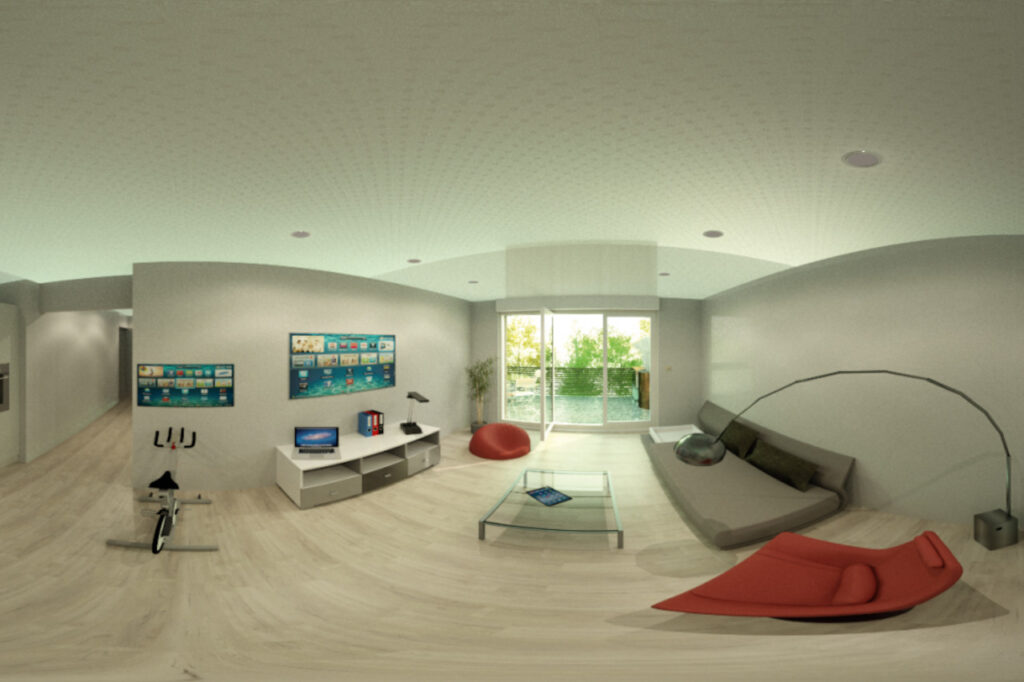[LUM#8] Research
What will the apartment of tomorrow look like? For three years, a team of researchers will analyze the daily lives of two students living in a hyper-connected apartment. The goal: to observe how new technologies are used in order to better utilize and protect ourselves from them. This project, called Human at Home, will begin in October 2018 in Montpellier.

It's seven o'clock, your alarm clock is ringing. You head to the bathroom. The mirror displays the day's weather forecast and your current playlist. In the kitchen, a tablet displays your schedule for the day and suggests ideas for going out in the evening. On the refrigerator, there is a shopping list automatically generated from what you have already consumed.
We are not in an episode of the famous science fiction series Black Mirror , but in the test apartment of the Human at Home (HUT) project. This apartment is equipped with around a hundred sensors that collect information on the habits and behaviors of its occupants. For example, the connected floor will provide information about their movements in the apartment, their gait, and other markers of well-being such as eating habits, possible musculoskeletal disorders, and postures, which can then be combined with the environmental data collected.
There will also be sensors linked to the apartment (temperature, atmospheric pressure), to external environmental parameters (humidity, pollution), and even so-called societal sensors linked to language, network connections, etc. "We need to define the contours of the future apartment that we don't want," explains Alain Foucaran, director of the Institute of Electronics and Systems (IES) and initiator of the project alongside Malo Depincé, deputy director of the Dynamics of Law laboratory. Instead of GAFAM [ Google, Amazon, Facebook, Apple, and Microsoft] telling us what is good for us, it is better to let the humanities and social sciences do so."
A "unique in the world" experience
To carry out this ambitious project, the two researchers brought together a consortium of twelve laboratories. Alongside the so-called "hard" sciences such as computer science, there are linguists, economists, anthropologists, psychologists, marketing specialists, and others. In total, there are around sixty researchers working on a project of rare scale for the humanities.
The experiment will last three years, with new occupants arriving each year. "There are similar projects with people staying for a day or two, but not long term," explains Malo Depincé. "This is a unique experiment worldwide. All existing living labs are tackling a technological challenge, whereas ours is a usage challenge," continues Alain Foucaran.
The challenge is to draw up a sort of inventory of "what is accepted or acceptable, interesting or not for the occupant, " explains Malo Depincé. We will surely have conditional interests. "I'm interested if... I agree, provided that...".With this in mind, the first residents selected will be students, "they don't have the same reservations as our generation," comments Alain Foucaran. However, a master switch will allow the apartment to be disconnected at the request of the occupants.
Inform and protect
It is also a legal challenge, since the second objective of the experiment is to create "a catalog of everything a house can learn about its occupants." Every day, we surf the internet, accept user agreements that are too long or too complicated to read, and use connected speakers " in a way that is far removed frominformed consent, or without even realizing that this information is being passed on to a third party, such as Google, Amazon, or Apple," laments Malo Depincé.
The occupants of the connected apartment will be "informed of the existence of each sensor, all the information that will be collected, and how it may be processed by a computer system." The experiment should enable lawyers to consider the legal tools that can be used to inform consumers simply and effectively about the nature of the data they provide, but also to protect them with regard to how it will be used. "There are certain elements of comfort that cannot be denied, but we must question the trade-offs of artificial intelligence," concludes Malo Depincé.
Theater hut
Hut Théâtre's idea is to stage the conflicts that could arise between technology users and others who are more reserved. This scientific and cultural project was launched by Alain Foucaran and Nicolas Dubourg (director of the Théâtre de la Vignette) as part of the experiment. For several months, researchers from the consortium will be able to express their positive or negative preconceptions about the situations encountered in the connected apartment. Two actors will then offer them various improvisations, which they will use to write a play together, likely to be staged at the Théâtre de la Vignette university theater in May 2019. Another unprecedented experiment.
To go further:
- Human at home: Towards intelligent human housing, 2021
- Podcast Science Has Fun From the connected home of tomorrow to the technologies of the past, 2021
- Podcast Science at UM: From the Human at Home Project to Sud de Sciences, 2022
- Game-changing data, 2023
Find UM podcasts now available on your favorite platform (Spotify, Deezer, Apple Podcasts, Amazon Music, etc.).